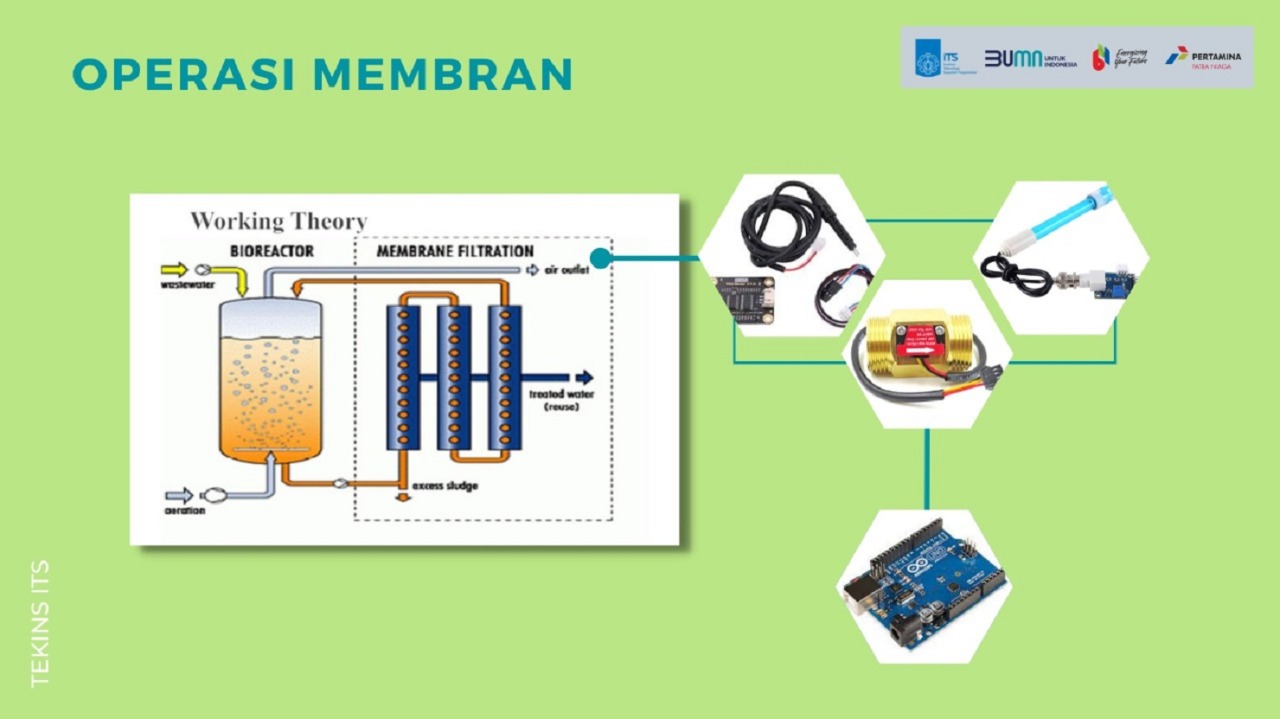ITS Students Initiate Livestock Liquid Waste Treatment System

(from left) Ahmad Prayoga, Nabiilah Aziizh Tjandra, and Akbar Krisna Wandana are a team of ITS students who designed the liquid waste treatment innovation
Campus ITS, ITS News – Water is an essential element in human life, but what happens if the water is contaminated with hazardous waste? To overcome this, three students of the Institut Teknologi Sepuluh Nopember (ITS) designed a wastewater treatment system for dairy farms to not pollute the surrounding water.
Nabiilah Aziizh Tjandra, Team Leader, revealed that several dairy farmers have not been able to manage waste properly. He gave an example in Cepogo District, Boyolali Regency, an area with abundant livestock commodities. However, 56.67 percent of dairy farmers still dispose of waste in river bodies without management. “This happens because most of them are conventional farms, so they don’t have a waste management system,” he said.
Furthermore, Nabiilah explained, from the research that has been carried out, it is known that the quality of river water has a number that exceeds the permitted wastewater quality standard, namely Chemical Oxygen Demand (COD) of 20 – 80 milligrams per liter and Total Suspended Solid (TSS) which reaches 64 – 94 milligrams per liter. “Therefore, we need an appropriate wastewater treatment system so that it does not pollute the environment,” said the student from Surabaya.

An innovative scheme for treating liquid waste from a cattle farm designed by the ITS student team
Based on this, Nabiilah and her team designed a wastewater treatment plant using a bioreactor membrane integrated with the Internet of Things (IoT) to make it easier for farmers. “The bioreactor membrane was chosen because it has been proven to be effective in improving the quality standard of the processed waste output,” explained this first-year student.
In the installation system designed by his team, Nabiilah explained that wastewater from livestock would enter the reservoir before being passed through the bioreactor membrane for filtration. The system is also equipped with sensors to ensure the quality of the waste output by quality standards, which is less than 50 milligrams per liter. “When the quality is not met, the wastewater will be filtered back into the bioreactor membrane,” he explained.

The liquid waste treatment mechanism is schematic, starting with the storage tank and ending in the river.
Not only that continued, Nabiilah, the wastewater treatment system designed by his team, is equipped with sensors that will detect cake fouling due to trapped impurities. This cake fouling causes the filtration process to be inefficient, so the membrane must be cleaned from the cake. “With this sensor, farmers will know when the membrane needs to be cleaned,” explained Nabiilah.
Together with Nabiilah, this team consists of two other ITS Instrumentation Engineering Department students, namely Akbar Krisna Wandana and Ahmad Prayoga. They believe that their wastewater treatment system is 99.98 percent effective at filtering hazardous chemical substances. “In the future, we hope that our innovation can be realized soon so that it can provide benefits to the community,” said Nabiilah optimistically.
Through an innovation entitled Application of a Bioreactor Membrane with an IoT-based Waste Output Quality Monitoring System on a Dairy Cattle Farm in Cepogo District, Boyolali Regency as an Effort to Reduce River Pollution, Nabilah and her team won 1st Place in the Pertamina Smart Innovation Boyolali 2022 event held by Pertamina Patra Niaga Boyolali, not too long ago. (ITS Public Relation)
Reporter: Tyara Novia Andhin
Related News
-
ITS Wins 2024 Project Implementation Award for Commitment to Gender Implementation
ITS Campus, ITS News —Not only technology-oriented, Institut Teknologi Sepuluh Nopember (ITS) also show its commitment to support gender
May 24, 2022 13:05 -
ITS Professor Researched the Role of Human Integration in Sustainable Architecture
ITS Campus, ITS News –The developing era has an impact on many aspects of life, including in the field
May 24, 2022 13:05 -
ITS Sends Off Group for Joint Homecoming to 64 Destination Areas
ITS Campus, ITS News — Approaching Eid al-Fitr, the Sepuluh Nopember Institute of Technology (ITS) is once again facilitating academics who want
May 24, 2022 13:05 -
ITS Expert: IHSG Decline Has Significant Impact on Indonesian Economy
ITS Campus, ITS News — The decline in the Composite Stock Price Index (IHSG) by five percent on March 18,
May 24, 2022 13:05
